Você já tentou abrir uma de suas postagens no WordPress e foi recebido por um erro 404? Às vezes, isso acontece quando estamos trabalhando em nossos próprios sites WordPress ou ajudando nossos usuários
Esse erro ocorre quando você consegue acessar a área de administração e o blog do WordPress, mas, ao tentar abrir uma postagem específica, recebe a mensagem “404 Not Found” (404 não encontrado).
Pode ser frustrante ver seu conteúdo aparentemente desaparecer, mas encontramos algumas soluções alternativas para corrigir esse problema. Neste guia completo, mostraremos a você como corrigir posts do WordPress que retornam erros 404.
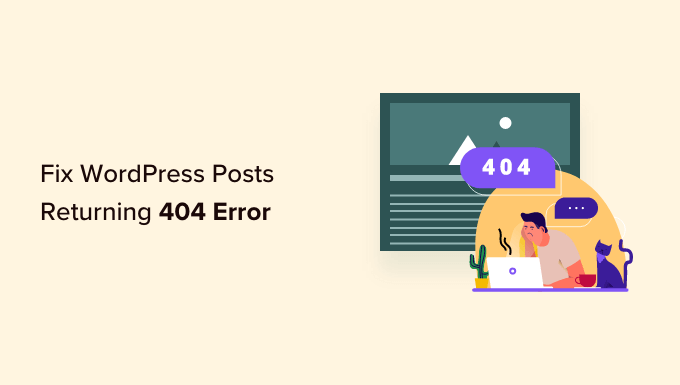
Por que meus posts do WordPress estão retornando um erro 404?
Há vários motivos pelos quais suas postagens podem estar mostrando um erro 404 “Página não encontrada” no WordPress. Esses motivos podem incluir:
- Conflitos de plugin ou tema: Às vezes, os plug-ins ou temas que você instalou em seu site podem interferir na forma como o WordPress lida com os permalinks. Isso pode levar a links quebrados e erros 404.
- Problemas de código personalizado: Se você adicionou código personalizado ao seu site, pode haver erros no código que estejam afetando os permalinks ou causando outros conflitos, resultando em erros 404 para suas postagens.
- Problemas com seu arquivo .htaccess: O arquivo .htaccess desempenha um papel importante na forma como o WordPress estrutura os URLs. Se esse arquivo estiver corrompido ou ausente, poderá resultar em erros 404 para seus posts ou páginas.
Como encontrar todos os posts do WordPress com erros 404
Antes de chegarmos às soluções, seria bom descobrir se esse erro está ocorrendo apenas em um ou dois posts ou em vários posts. Dessa forma, você poderá determinar o escopo do problema e escolher a solução mais adequada.
Uma maneira fácil de descobrir isso é usar o Google Search Console. Se você ainda não enviou seu site para o Google Search Console, leia nosso guia sobre como adicionar seu site WordPress ao Google Search Console.
Depois que o bot do Google rastrear e indexar o seu site, o Google Search Console fornecerá informações detalhadas sobre o desempenho do seu site, inclusive os erros 404 encontrados.
Para descobrir quais publicações estão retornando erros 404, faça login no painel do Search Console. Em seguida, navegue até o relatório “Páginas” e você verá uma lista detalhada de todos os erros.
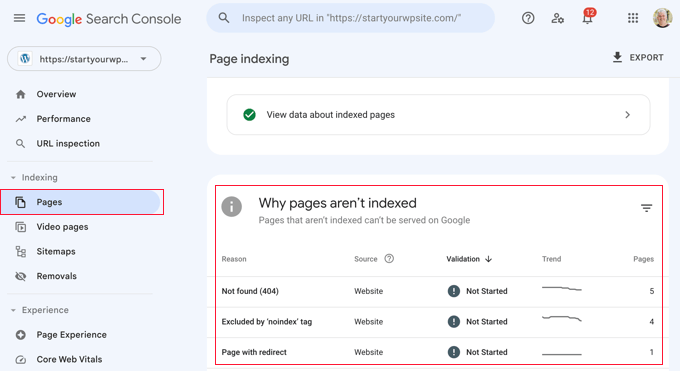
Para obter mais informações, leia nossa lista de dicas para usar o Google Search Console para aumentar o tráfego do site, que inclui algumas dicas sobre como corrigir erros 404 com a ferramenta.
Dito isso, vamos dar uma olhada em como corrigir posts do WordPress que retornam erros 404. Você pode usar os links abaixo para ir direto às diferentes soluções:
Não tem tempo para corrigir erros 404 por conta própria? O WPBeginner Pro Services pode ajudar! Com o nosso Suporte de Emergência para WordPress acessível, você pode contratar especialistas para corrigir erros 404, links quebrados, problemas de redirecionamento e muito mais. Pare de se estressar com os problemas do WordPress e resolva-os! Agende serviços de suporte emergencial para WordPress hoje mesmo!
Método 1: Verifique se há conflitos de plug-ins ou temas e problemas de código personalizado
Às vezes, plugins, temas ou códigos personalizados que você adicionou ao seu site WordPress podem interferir nos permalinks ou causar conflitos, levando a erros 404. Nós mesmos já passamos por isso quando testamos ferramentas em nosso site de demonstração.
Uma maneira de resolver esse problema é desativar temporariamente os plug-ins. Às vezes, os plug-ins podem atrapalhar a maneira como o WordPress lida com os links.
Depois de desativar os plug-ins, você pode reativá-los um a um e verificar se o erro 404 reaparece após a ativação de cada plug-in. Se o erro aparecer após a ativação de um plug-in específico, ele pode ser o culpado.
Em seguida, você pode fazer uma pesquisa rápida no Google para encontrar soluções relacionadas a esse plug-in ou entrar em contato com o desenvolvedor do plug-in para obter suporte.
Da mesma forma, seu tema do WordPress pode estar causando o conflito.
Para verificar, você pode mudar temporariamente para um tema padrão do WordPress, como Twenty Twenty-Three ou Twenty Twenty-Four. Tudo o que você precisa fazer é acessar Appearance “ Temas e clicar em “Ativar” em um tema padrão.

Se o erro 404 desaparecer com o tema padrão, isso indica um possível conflito com seu tema atual. Você pode tentar solucionar o problema com o tema ou considerar o uso de um tema diferente.
Você pode dar uma olhada em nossa seleção de especialistas dos temas mais populares do WordPress para obter recomendações.
Se você inseriu recentemente trechos de código em seu site, pode haver erros no código que estão causando os erros 404. Dê uma olhada no código que você adicionou e veja se consegue identificar algum erro.
A maneira mais segura de adicionar trechos de código ao WordPress é com o plug-in WPCode. Esse plug-in permite que você insira código personalizado sem trabalhar diretamente com os arquivos do tema, reduzindo o risco de danificar seu site.
Além disso, sempre que o WPCode detectar um erro no seu código, ele desativará automaticamente o snippet e solicitará que você o verifique. Você também pode usar o modo de teste para verificar se o código funciona antes de colocá-lo no site ativo.
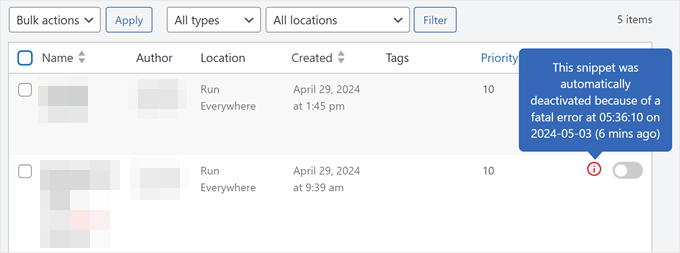
Se nenhuma dessas soluções funcionar, passe para o próximo método, no qual solucionaremos os problemas de suas configurações de permalink.
Método 2: Corrigir suas configurações de link permanente
Os posts do WordPress podem retornar erros 404 devido a problemas com regras de reescrita em seu arquivo .htaccess. Na maioria dos casos, você pode corrigir o problema atualizando suas configurações de permalink.
Basta acessar Configurações ” Permalinks em seu administrador do WordPress e clicar no botão “Salvar alterações”.
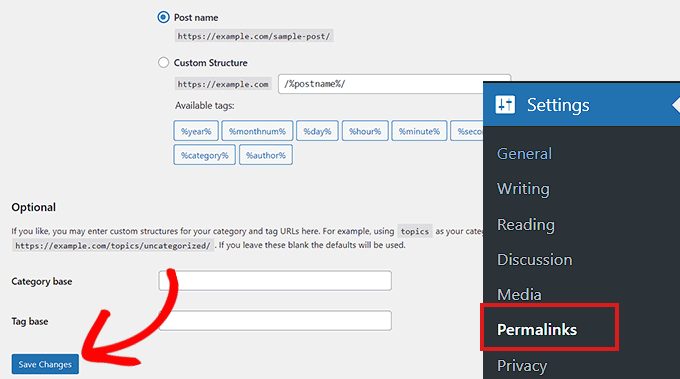
Não há necessidade de fazer alterações nas próprias configurações de permalink. Isso atualizará suas configurações de permalink e liberará as regras de reescrita.
Na maioria dos casos, essa solução corrige o erro 404 dos posts do WordPress. No entanto, se não funcionar para você, provavelmente precisará atualizar o arquivo .htaccess manualmente.
Método 3: Atualizar o arquivo .htaccess do WordPress
Antes de começar, certifique-se de fazer o backup do arquivo .htaccess do WordPress. Se algo der errado, você poderá restaurar facilmente o arquivo original.
Agora, você precisará se conectar ao seu servidor usando um cliente FTP como o FileZilla ou o aplicativo File Manager no painel de hospedagem do WordPress.
Em seguida, você precisará localizar e editar o arquivo .htaccess, que está localizado no mesmo local que pastas como /wp-content/ e /wp-includes/.
Basta clicar com o botão direito do mouse no arquivo e selecionar “File permissions” (Permissões de arquivo).
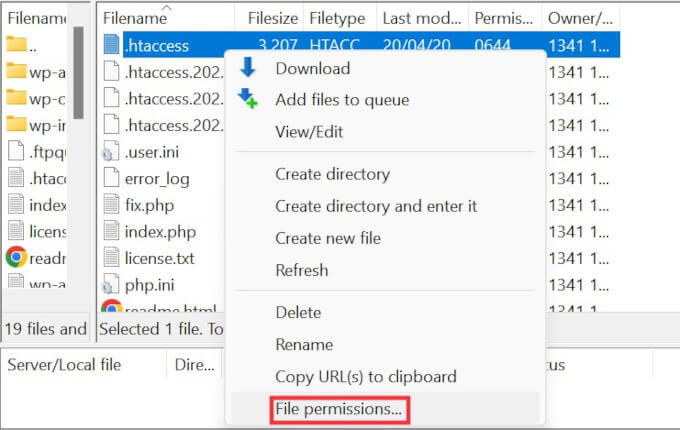
Você pode tornar o arquivo gravável alterando suas permissões para 666.
Basta digitar “666” na caixa “Valor numérico” e clicar em “OK”.
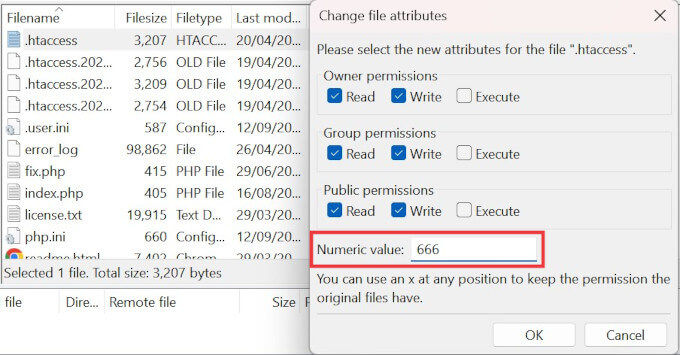
Em seguida, você precisa repetir as etapas do primeiro método do nosso tutorial. Depois de fazer isso, não se esqueça de alterar as permissões de volta para 660.
Você também pode editar o arquivo e adicionar código a ele.
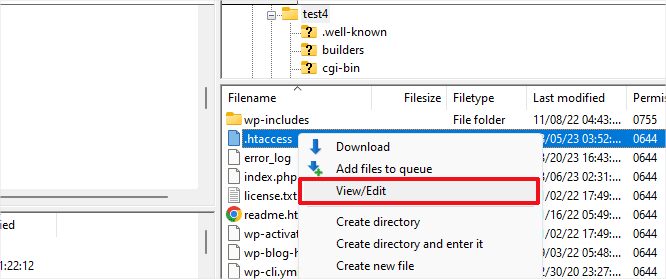
Depois de abrir o arquivo .htaccess com um editor de texto, basta inserir este código:
1 2 3 4 5 6 7 8 9 10 | # BEGIN WordPress<IfModule mod_rewrite.c>RewriteEngine OnRewriteBase /RewriteRule ^index\.php$ - [L]RewriteCond %{REQUEST_FILENAME} !-fRewriteCond %{REQUEST_FILENAME} !-dRewriteRule . /index.php [L]</IfModule># END WordPress |
Método 4: Entre em contato com o provedor de hospedagem
Se nenhuma das soluções acima tiver corrigido o erro de retorno 404 dos posts do WordPress, recomendamos entrar em contato com o provedor de hospedagem do WordPress. Pode haver um erro do lado deles ou eles podem ajudá-lo a solucionar o problema.
Consulte também nosso guia sobre como solicitar corretamente o suporte do WordPress e obtê-lo.
Método 5: Ativar mod-rewrite (instalação local do WordPress)
Se estiver usando um servidor local para fins de teste, será necessário ativar o mod_rewrite na configuração do Apache do seu site MAMP, WAMP ou XAMPP.
Isso permitirá que o WordPress gere URLs limpos e evite o erro 404 para posts e páginas em seu servidor local.
A forma de fazer isso varia de acordo com a plataforma que você usa. As pessoas que usam o XAMPP podem abrir o painel de controle e clicar no botão “Config” em Actions. Em seguida, selecione “Apache (httpd.conf)”.
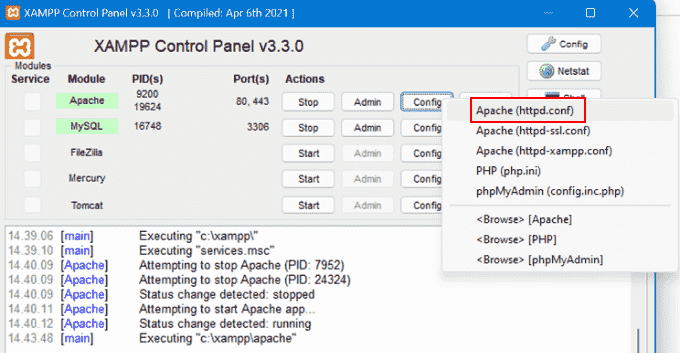
Em seguida, você precisará encontrar esta linha #LoadModule rewrite_module modules/mod_rewrite.so e remover o ‘#’ para descomentá-la.
Isso carregará o mod_rewrite.
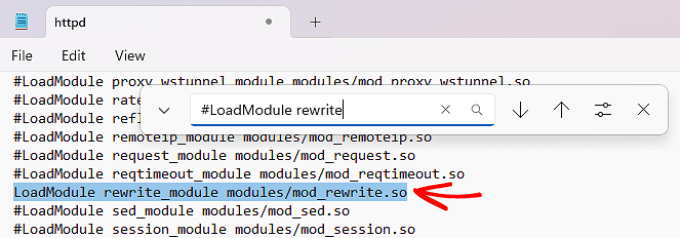
Em seguida, localize todas as instâncias de AllowOverride None e altere-as para AllowOverride All.
O valor “All” significa que todas as diretivas podem ser substituídas.
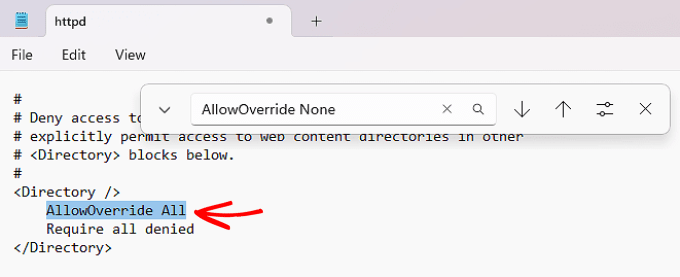
Uma vez concluído, você pode salvar o arquivo httpd.conf e fechá-lo. Depois disso, no painel de controle do XAMPP, clique em “Stop” (Parar) no módulo Apache e em “Start” (Iniciar) novamente para reiniciá-lo.
Em seguida, volte ao painel de administração para ver se os permalinks estão funcionando.
Tutorial em vídeo
Se você precisar de instruções visuais, basta assistir ao vídeo abaixo.
Esperamos que este artigo tenha ajudado você a solucionar os erros de mensagens que retornam 404 no WordPress. Talvez você também queira ver nosso guia sobre os erros mais comuns do WordPress e como corrigi-los, além de nossas escolhas de especialistas sobre os melhores plug-ins do WordPress para expandir seu site.
Se você gostou deste artigo, inscreva-se em nosso canal do YouTube para receber tutoriais em vídeo sobre o WordPress. Você também pode nos encontrar no Twitter e no Facebook.





Rj
thanks man u saved my life
Phannipha
Thank you for very useful sharing. Just only one click can solve the problem:)
Ehiz Mikey
A million thanks Syed. I was stuck here for a couple of weeks. A fix indeed.
Kaycee
Hi. Really nice article.
I had a 500 internal server error issue with my site when I tried using the W3 Total Cache plugin.
To fix this, I renamed the .htaccess file to .htaccessbak. After doing this, I noticed that the 500 error cleared but then I got a 404 error! All the links and pages on my site returned a 404.
On the All Pages section, I see a link that says “Purge from cache”
Please what do I do to clear this issue?
Stanley
You’re a life saver, worked for me.
Really grateful,
Thank you
syed
thanks it works for me….
Christian Fraunholz
but why is that happening and how to fix it forever?
Karma
I tried to follow your direction in fixing my problem, it took for about a day, but I didn’t find the good result.
Then I gave up and contacted my hosting. And it fixed only in 5 minutes. Lol the problem came from the hosting…
Mark Kay
By careful with post variables names. I had a contact form with an input field called “name”, that caused WordPress to show the 404 page. Took me a long time to figure out the problem. I fixed it be changing the field name from “name” to “your-name”.
Ivan
thanks you saved my life.
Ramzan
My problem is that I m going to wp adminin
And want to edit post it is not going in edit mode of post and page gives me error page not found 404 but my site and its pages are opening well in browser
Plz guide me I can solve this problem
Ben
Samo rpoblem here. Cannot edit the existing posts or add new one. I get 404 for both
Sunit
Hi, I have tried following the above steps but my issue is this: when I visit my website directly by putting typing the url, then it works fine. But, when i type in my site url in google search box and then click on the link from the search results, I get the 404 error or message saying “your connection is not private”.
My website is http://www.example.com but google search result shows it as https://example.com/
So not sure what the issue is. I used to have wordpress.com but now I am dong self-host using HG.
Any help will be appreciated.
Thanks
WPBeginner Support
www is considered a subdomain of a domain. So basically a site with www and without www will be considered two different sites by search engines. Go to Settings > General page to change your site URL from http://www.example.com to just example.com.
WordPress.com enabled https for all custom domains on WordPress.com. This means Google had already crawled your website with https in the URL. You can install free https using Let’s Encrypt.
Admin
Paul Nicholson
Great worked for me thanks!!
Shashdhar S
Thanks a lot , the second option worked for me ….. Thank you so muich
eliana
Just THANK YOU!
eli
WPBeginner Support
You are welcome Don’t forget to follow us on Twitter for more WordPress tips.
Don’t forget to follow us on Twitter for more WordPress tips.
Admin
Michaela
hi, I tried first solution, nothing happened. I wanted to try the second, but I cannot find the .htaccess file. Not in FTP, not even in my WP online editor. I had this issue today for the first time. I use WPML plugin, until now everything went without problem, but today my translated post in English throws this 404 Error. Any idea what shall I do if I cannot locate the .htaccess file?
Thanks!
Michaela
I noticed one thing. The post in the editor shows me the following link:
example.com/2016/09/15/where-eat-in-barcelona/?lang=en
but when I click to see the post, or from any RSS feed click on the published post, the link showing 404 error is as follows:
example.com/?p=11409&lang=en
WPBeginner Support
Please take a look at our guide on why you can’t find .htaccess file on your WordPress site.
Admin
Shirish Dhungel
Well thanks! I remember, that WP Super Cache official stated to remove rewrite code from .htaccess. After that, my posts redirected to 404. Thanks to you, now my site is perfectly fine.
Muhammad Nasir
Thanks it worked for me, thank you so much.
Akhelesh
Do I have to remove the code snippet I added to htacces file after my problem has been solved?
Jessica
Can someone contact me please? I am so new to these I don’t even know what a FTP server is…
WPBeginner Support
Please see our guide on using FTP.
Admin
Rohan khamkar
Sir, when I post a new post it gives me error that 404 page not found. Previously everything was fine but when I add a new user and give him a role of administrator from that time I can’t post new post. Any solution Please. Thank you in advance.
WPBeginner Support
You should never give administrator role to a user you don’t trust. You can always change back their role by going to Users page and then clicking on the Edit link below the user that you want to change. After that you check your site’s permalink structure. See if they installed any new plugin and if they did, then deactivate that plugin.
Admin
Shivani Sehdev
Wow……….. Solved a long ago problem .
Thanks A lot.
R Donahoo
Didn’t work on my apache server. Had an additional step to allow mod_rewrite to actually work. Edit your httpd.conf file and add ‘Allowoverride all’. For example:
DocumentRoot /var/www
find the section that sets up the directory options, such as:
Options Indexes FollowSymLinks MultiViews
Order allow,deny
allow from all
add Allowoverride all
Options Indexes FollowSymLinks MultiViews
AllowOverride all
Order allow,deny
allow from all
save and restart the web server to re-read the updated configuration.
All was well after that.
Thanks for your useful post moving me into the right direction.
Arnaud
forgot about htis #yaDaMan
Ben
Didn’t work for me either
Where can I find this file you are talking about
aderele olutayo samuel
this worked. …. Thanks
Eva
I found the some problem. However, I could not log in to the admin page. Could you give solution to mitigate this problem?
Rodrick Green
This was very easy and very helpful. THANKS A LOT!!!
B Pandey
thanks for your usefull tip. It worked for me on my website. Thanks a lot
sheldon
Thank you .
It worked for me
Rachit Sharma
but not working for me when i updated permalink with post name and change .htcces file but not worked. any other solution for that.
Ahsan
Wowww Thank you so much, that was really helpful.
In my case it was WAMP server, after turning on “rewrite module” in apache, my problem was solved.
Thanks.
Kailash
Wow – this still works. Done a search on google and found articles in wordpress but this was by far the simple-est and bang it works.
Thanks a mill – saved me a heap of time
WPBeginner Support
Glad you found it helpful.
Admin
Shawn Ritch
Hello and thanks for all the useful tips. Unfortunately, this tip didn’t work for me. I re-saved my permalinks in WordPress settings (didn’t work) so then I tried your next method and it didn’t work either. I’m thinking the reason for this is because I have different permissions. My original permission is 644. When I change permission to 660 none of my pages work so I believe the 666 permission is wrong as well. I’m using a Go Daddy server if that helps any :/
I’m at a loss and have no idea what to do from here. However, I can’t afford to have pages that don’t work. Any suggestions would be greatly appreciated.
Thanks
Shawn Ritch
Kevin Garcia
I tried this and it didn’t help me!!! My whole website crashed and had to restore it!!
Hannah Brown
Thanks, yours was the only place that told me HOW to fix my broken links! You’re the best
WPBeginner Support
Glad you found it helpful.
Admin
Kunal Yande
Thanks !!
You save my so much time….
Chris
How do I fix the issue when I upload a new plugin and then my categories, not posts, become 404?
Bob
This is great advice. I thought I was going to have to take a deep dive, but two clicks and I’m GTG. Thanks!
Ronn Reason
hi
i keep getting this message with my email account;
Error Oops… a server error occurred and your email was not saved. (#404)
Please advise ASAP
Gabo
O.O
I can’t belive this …. it works, thanks !!!!!
Steve
I had this problem after moving sites to a new server. Default Permalinks worked, but not the settings I was using.
I needed the apache server to “Allow Override” for the htaccess file to take effect.
Vivek
Hi,
I need a little help regarding 404 error.
I am getting 404 error in my Page 2 section.
I have googled a couple of times. but did not get the solution.
Could you please tell me what is the reason for it?
Rudy
My site links will work ONLY after I’ve VIEWED the permalink settings, without any changes, and Voila! The links work again. What is causing this and how can I program this instead of having to log in?
I’ve tried the following commands in WP-CLI to no avail:
wp rewrite flush –hard –path=c:\xampp\htdocs\mywordpress
wp cache flush –path=c:\xampp\htdocs\mywordpress
Amit Schandillia
This saved my life!!!!!
Patrick
Thanks man, just pressing the “Save changes” on the permalink-settings page did it for me! Cheers!
Amanda
Hi there,
About an hour ago I was able to remedy a pesky ‘500 Internal Service Error’ by following your sage advice and renaming the .htaccess file to .htaccess_old. I was immediately able to access my wp-admin area–and I thought–get going again.
Unfortunately, something happened which rendered all of my other pages unfindable; each kicking a 404 error.
I attempted the steps you provided above, but to no avail. Might you have any further suggestions?
Thank you.
Jessa
You guys are awesome, this was easy and fast. You guys save me a trouble!
mehdi
why i coudl not see my post?
after I send a post my preveous posts appear.
it made me crazy please remove previous post
…
I found a solution to my problem and will say in next post
mehdi
Hello agin
thank you for this useful article/ I found a bug in wordpress in rtl language in displaying permalink
I read your article and encourage to solve the problem with your contribute.
——————————————
my problem in detail:
1-I created a mysql database(in utf8 general ci)
2-I installed last wordpress versin(locally) and install my theme(multiup v 1.2 from themeforst)
3-Next I did import demo as whele.
in the theme admin panel exixst category portfolio (in this section we create our category with name and slug) then in all post under portfolio section we can create our posts and determine category of post from portfolio category) finally in homepage we have a section that shows portfolio post in category(with their picture)
In english slug and name the category of portfolio show well but when i change category in portfolio category( slug) into rtl language the category in homepage canvert into charachter like base 64(I think that my slug convert into ansi ie each character convert into 6 charachter)
How I can overcome my problem?I think I must avoid change slug or show slug into utf8 or unicode . I am beginer in wpordpress , If I khnew wordpress more I could solve this simple problem .Any one with khnowledge of handling hoock and filter and plugin and wordpress can solve this permalink problem . I sure I will solve this problem with your help.
———————————-
I tried the second way you offer (that phpmyadmin in utf8generalci) but it doee not work for me.
before thansk a lot for helping me.I followed your posts regularly .
……………………………….
1- first I did the trick in above article (this is so good but didnot solve my problem)
2-
mehdi
hello
thanks to contribute you knowledge to others .my english is not well.excuse me.
I download a wordpress theme with portfolio link in admin panel that in porftoli section we can define some category with name and slug . in post we can determine category from portfolio.
in homepage we can display post in portfolio category! all thing is ok but wen i chang name and slug into rtl language the title of a group in home page shows like this %d8%a8%d8%b1%d9%86%d8%af%d8%b3%d8%a7%d8%b2%db%8c
i did your solution in this topic and that another topic(How To Enable Custom Permalinks) but not woks for my problem!
WPBeginner Support
This could happen if your WordPress database is not using UTF-8 character encoding. Please make sure that your database is using utf8_general_ci as collation. You can check that using phpMyAdmin from cpanel. Before you make any changes to your database, please create a complete WordPress backup first.
Admin
Atula Gupta
Thank you so much for fixing my problem in seconds! I was panicking about all my posts giving this error and this solution was so simple! Thanks again.
Sammy
Thank you, thank you! This was making me crazy and you just helped me fix it in 2 seconds. High five.